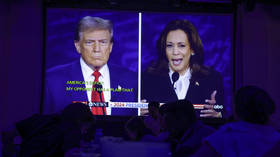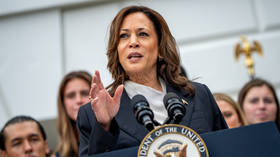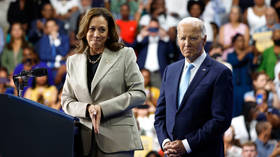The US presidential debate was a degenerate political show, and Harris won

The outcome of American presidential elections rarely turns on the performance of candidates in televised debates – Kennedy’s victory over Nixon in 1960, and Bush’s win over Dukakis in 1988 were very much the exceptions that prove the general rule.
Equally exceptional was Joe Biden’s disastrous campaign – ending with the performance in his debate with Donald Trump a few months ago.
Debates are far less important now than they were in the past.
In fact, contemporary American politics has become so irrational and celebrity-focused that the very notion of a ‘debate’ seems like a quaint relic from a bygone era – in which rational argument was still an integral part of the political process.
Those days are long gone, and Donald Trump – the celebrity politician par excellence – has done more than anyone to expunge rationality from American politics and transform it into a tawdry and debauched branch of celebrity culture.
American voters are currently divided into two opposing camps – both of which eschew rationality and espouse views that are emotionally based and lack a firm grounding in reality.
Each camp believes that the other is the personification of ‘evil’ and poses a grave existential threat to America’s future. Within such a deeply divided and irrational polity – where ‘magical thinking’ prevails – there is little room for rational debate.
American political culture is unique in this regard – and commentators in other Western democracies often have difficulty in appreciating its distinctiveness and, as a consequence, understanding Trump’s continuing popularity and effectiveness as a politician.
Trump is sui generis – and he could never have attained high office in any other Western democracy.
Notwithstanding some superficial similarities, Trump differs qualitatively from other populist politicians in the West – like Nigel Farage and Marine Le Pen.
No convicted felon and fomenter of insurrection who refused to accept an election defeat, even after unsuccessfully challenging it in the courts, could seriously aspire to become prime minister or president in Britain or France.
Trump is both cause and symptom of the decline of the American Republic.
At the conclusion of the Constitutional Convention in Philadelphia in September 1787 – at which the American constitution was drafted – Benjamin Franklin was asked how long he thought the new American Republic would last. Franklin replied that it would last as long as the American people deserved it, and prophesised that it may “end in despotism ……. if the people become so corrupted as to need despotic government.”
Kamala Harris was the clear winner in last night's debate at the National Convention Centre in Philadelphia – viewed by 100 million Americans – but the election race remains close, with Harris marginally ahead in most credible polls.
How did the candidates perform?
Harris used the debate to raise her profile with voters – something she needed to do – and let them know precisely what she stands for in terms of policy issues. She appeared tough, intelligent, and handled Trump as well as any mainstream politician has done in the past.
Somewhat surprisingly, Harris directly attacked Trump in respect of his contempt for liberal democracy and the rule of law. On a number of occasions she asserted that Trump was “unfit to be president.”
Harris also managed to convey to voters a positive vision of America’s future – “I represent a new generation of leadership in our country that offers optimism” – that contrasted dramatically with Trump’s divisiveness, crassness and pessimism.
Trump constantly asserted that “we are a failing nation” did not explain how he would “make America great again” – his famous slogan, which he never even used during the entire debate.
Harris and the Democrats will no doubt be pleased with her performance.
In typical fashion, Trump sought to undermine the legitimacy of the debate process in advance, by attacking the ABC host network earlier this week: “The ABC is, I think, the worst of everybody.”
Trump also spent little time preparing for the debate – telling Fox News this week that “Everybody has a plan until they get punched in the face,” apparently a saying of ageing former heavyweight boxer Mike Tyson.
Trump performed much as expected – rather than debate policy issues on the merits he resorted to endless lies and insults, replete with stream of consciousness tirades and non sequiturs.
Trump also sought to deflect debate on policy issues by referring constantly to illegal immigration.
This was also predictable – for weeks he has ignored advice from his advisors to focus directly on policy issues, like the economy and cost of living, where Harris and the Democrats are vulnerable.
Nevertheless, Trump appeared quite assured and coherent – more so than in recent rally appearances.
What were the highlights for each candidate?
For Harris, they include the following:
- she accused Trump of having perpetrated “the worst attack on democracy since the Civil War” and having “incited a violent mob to attack our nation’s capital”;
- she accused Trump of “selling out America to China”;
- she described Trump’s policy on abortion as “immoral’ and “insulting to the women of America”;
- she accused Trump as “having no respect for the rule of law”;
- she said that “world leaders were laughing at Trump” and that “dictators could manipulate him”;
- she alleged that America’s military elite held Trump in contempt;
- she said that “Trump has used race to divide the American people.”
In conclusion, Harris asserted that the candidates represented “two very different versions of our country – one based on the future, one based on the past”. She was committed to “bringing America together” and “turning the page.”
Trump made the following points about Harris:
- she is a Marxist;
- she has “destroyed the economy”;
- she has allowed 21 million illegal immigrants to enter America; which has “destroyed the fabric of the country” by creating widespread “migrant crime’ and creating unemployment;
- she had “weaponised the Justice Department” against him;
- she had supported the Black Lives Matter rioters;
- he asserted that “Biden hates her”;
- he asserted that she “hated Israel” and would provoke “World War III.”
Trump also staunchly defended his “stolen election” claim and maintained that he “had nothing to do with “the January 6 insurrection" – even though he has been indicted for encouraging it. He also alleged that the American judiciary – excluding the Supreme Court on those few occasions when it had ruled in his favour – and the FBI were corrupt.
More controversially he alleged that illegal immigrants were “eating pets in Springfield.”
In short, it was a typical bravura Trump performance.
Notwithstanding Harris’ victory in the debate, this year’s presidential election will be decided by a few hundred thousand voters in half a dozen battleground states – Pennsylvania, Michigan, Wisconsin, Georgia, Arizona and Nevada.
Biden won all of these states in 2020, and polls suggest that Harris and Trump are neck and neck in most of them at the moment. Harris has one clear advantage over Trump – her campaign is spending twice as much as the Trump campaign.
Yesterday's debate may have marginally improved Harris’ prospects of becoming president in November – but the outcome, at the end of the day, will turn on how effectively the two candidates campaign in the battleground states over the next two months.
The statements, views and opinions expressed in this column are solely those of the author and do not necessarily represent those of RT.















